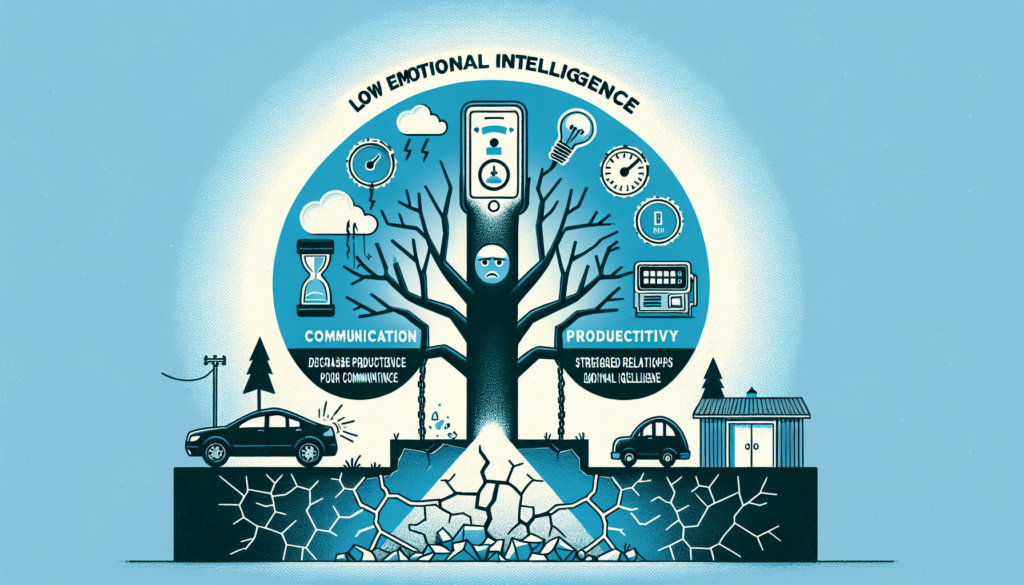In today’s fast-paced and interconnected world, workplace dynamics play a crucial role in the success of any organization. The ability to navigate through diverse personalities, handle conflicts, and foster positive relationships is essential for a harmonious and productive work environment. However, the impact of lack of emotional intelligence often goes unnoticed but can have significant consequences. When individuals struggle with understanding and managing their own emotions and empathizing with others, it can lead to strained relationships, decreased productivity, and ultimately, a toxic work atmosphere. This article explores the detrimental effects of lacking emotional intelligence in the workplace and highlights the importance of developing this crucial skill for personal and professional growth.

The Role of Emotional Intelligence in the Workplace
Emotional intelligence refers to the ability to recognize, understand, and manage our own emotions, as well as the emotions of others. It involves effectively recognizing and managing our emotions, as well as empathizing with others and building strong relationships. Emotional intelligence is becoming increasingly important in the workplace as organizations recognize its impact on communication, teamwork, and leadership.
What is emotional intelligence?
Emotional intelligence can be broken down into several key components. Firstly, self-awareness is the ability to recognize and understand one’s own emotions, strengths, and weaknesses. It involves being in tune with our own feelings and motivations.
Secondly, self-regulation is the ability to manage and control our emotions in different situations. It involves maintaining composure, handling stress, and adapting to change effectively.
Thirdly, empathy is the ability to understand and relate to the emotions and experiences of others. It involves being able to see things from their perspective and respond with compassion and understanding.
Lastly, there is social skill, which refers to the ability to build and maintain relationships, communicate effectively, and work well in teams. It involves being able to navigate social situations and collaborate with others.
Why is emotional intelligence important in the workplace?
Emotional intelligence plays a crucial role in the workplace for several reasons. Firstly, it enhances communication. Employees with high emotional intelligence can accurately interpret and convey their own emotions, as well as understand the emotions expressed by others. This results in clearer and more effective communication, reducing misunderstandings and conflicts.
Secondly, emotional intelligence is vital for building and maintaining relationships. When employees are emotionally intelligent, they can empathize with their colleagues, understand their perspectives, and build trust. This leads to stronger and more positive working relationships, increased collaboration, and higher productivity.
Thirdly, emotional intelligence fosters greater empathy and understanding within teams. This helps to create a supportive and inclusive work environment where individuals feel valued and understood. When team members can understand and support each other emotionally, conflicts are minimized, and morale is boosted.
Lastly, emotional intelligence is key for effective leadership. Leaders with high emotional intelligence can inspire and motivate their teams, understand their strengths and weaknesses, and provide meaningful feedback. They are also better equipped to manage conflicts and create a positive and productive work culture.
Components of emotional intelligence
As mentioned earlier, emotional intelligence consists of various components. These components work together to create a well-rounded individual who can effectively manage emotions in the workplace.
Self-awareness is the foundation of emotional intelligence. It involves recognizing and understanding one’s own emotions, strengths, and weaknesses. Self-aware individuals are able to accurately assess their own feelings and understand how they may impact others.
Self-regulation refers to the ability to manage and control one’s emotions. This involves staying calm and composed even in high-pressure situations, effectively managing stress, and adapting to change. Self-regulated individuals are able to respond thoughtfully rather than react impulsively.
Empathy is the ability to understand and relate to the emotions and experiences of others. It involves actively listening, considering others’ perspectives, and responding with compassion. Empathetic individuals are able to build strong relationships based on trust and mutual understanding.
Social skills encompass a range of abilities, including effective communication, teamwork, and collaboration. Individuals with strong social skills can navigate social situations, build and maintain relationships, and work well in teams. They are able to communicate clearly and assertively, resolve conflicts, and facilitate positive interactions.
The Impact of Lack of Emotional Intelligence on Workplace Dynamics
When emotional intelligence is lacking in the workplace, it can have a detrimental impact on various aspects of organizational dynamics.
Negative effects on communication
Communication is crucial for effective teamwork and collaboration. However, when individuals lack emotional intelligence, their ability to convey their thoughts and feelings accurately can be compromised. This can lead to misunderstandings, misinterpretations, and breakdowns in communication. The result is a decrease in productivity and an increase in conflicts.
Difficulty in building and maintaining relationships
Lack of emotional intelligence can make it challenging for individuals to build and maintain relationships with their colleagues. Without the ability to empathize and understand others’ emotions, connections become superficial and trust is eroded. This can have a negative impact on teamwork, collaboration, and overall workplace morale.
Lack of empathy and understanding
One of the key components of emotional intelligence is empathy. When individuals lack empathy, they struggle to understand and relate to the experiences and emotions of others. This leads to a lack of support, understanding, and compassion within the workplace. It also makes it difficult to resolve conflicts and build strong relationships.
Increased conflicts and tension
In workplaces where emotional intelligence is lacking, conflicts and tension between employees are more likely to occur. The inability to effectively manage emotions, understand others’ perspectives, and communicate constructively exacerbates conflicts and creates a hostile work environment. This not only affects individual well-being but also hampers overall team performance.
Low morale and decreased motivation
When emotional intelligence is lacking, employees may feel undervalued, misunderstood, and unsupported. This can result in low morale and decreased motivation to perform at their best. Without a positive work environment that fosters emotional intelligence, employees are more likely to become disengaged, leading to decreased productivity and higher turnover rates.
Emotional Intelligence and Leadership
Emotional intelligence is crucial for effective leadership. Leaders who possess emotional intelligence can inspire, motivate, and engage their teams. They understand and respond to the needs and emotions of their employees, fostering stronger connections and higher levels of trust. They are also better equipped to manage conflicts and create a positive work culture.

